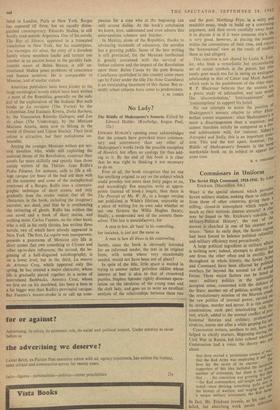No Lady?
EDWARD HURLER'S opening essay acknowledges that the sonnets have provoked more commen- tary and controversy than any other of Shakespeare's works (with the possible exception of Hamlet), but offers no apology for thus add- ing to it. By the end of this book it is clear that he was right in thinking it not necessary to do so.
First of all, the book recognises that no one has anything original to say on the subject which could possibly last more than forty pages or so, and accordingly five essayists write at appro- priate (instead of book-) length; then there is The Portrait of Mr. W. H., in a longer version not published in Wilde's lifetime, enjoyable as a piece of writing for its own sake whether or not one favours the Willie Hughes theory; finally, a modernised text of the sonnets them- selves. This last is unsatisfactory, for
A man in hue, all 'hues' in his controlling, for instance, is just not the same as A man in hew all Hews in his controwling.
Surely, since the book is obviously intended for an informed reader, the text in its original form, with notes where very occasionally needed, would not have been out of place?
In spite of the title, little space is wasted in trying to answer rather pointless riddles whose interest at best is akin to that of crossword puzzles. Stephen Spender rightly dismisses specu- lation on the identities of the young man and the dark lady, and goes on to write an excellent analysis of the relationships between these two in a witty and readable essay, tends to build up a convincing argument, and then move carefully away from it to discuss it as if it were someone else's. He is very good, however, at placing the sonnets within the conventions of their time, and rejects the 'homosexual' view as the result of reading them as bad allegory.
This rejection is not shared by Leslie A..Fied- ler, who finds a remarkable but unconvincing set of sexual symbols in the poems, but who surely goes much too far in seeing an analogous relationship in that of Caesar and Mark Antony which ends in the punishment of the older man' R P. Blackmur believes that the sonnets are a poetic study of infatuation, and uses words like .discombobolate,' Linterinani mates' and 'transumptions' to support his belief. No one attempts to assess the position of Shakespeare's sonnets relative to other Eliza bethan sonnet sequences: since Shakespeare's is, more a disarrangement than a sequence, and cannot therefore strictly be compared as a for," mal achievement with, for instance, Sidney s Astrophel and Stella, this is an important omis- sion. This and the text apart, however. The, Riddle of Shakespeare's Sonnets is the mostworthwhile book on its subject to appear for 1
some time.
B. S. JOHNSON


































 Previous page
Previous page